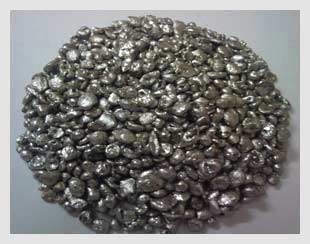Open here for our page navigation
Antimony Shot, Sb
99.999% pure
Antimony is used as a hardening alloy for lead, especially in storage batteries and cable sheaths, and also used in bearing metal, type metal, solder, collapsible tubes and foil, sheet and pipes, and semiconductor technology.
The most important use of antimony in the United States is in chemicals used to impregnate plastics, textiles, rubber and other materials as a flame retardant – that is, a form of fireproofing. This is required by federal law for certain childrens’ clothing. Over half the annual U.S. antimony consumption is for the manufacture of flame retardants.
A portion of U.S. consumption is in antimony alloys. Antimony is mixed (that is, alloyed) with other metals, such as lead, to make the lead harder and stronger for use in lead-acid batteries. On the other hand, some alloys such as Babbitt Metal (an alloy of antimony, tin, copper and sometimes lead) are useful as machine bearings because they are soft and slippery. Antimony is also alloyed with tin to make pewter items such as plates, pitchers and cups, used mostly for decoration. One use of antimony, which is declining, is to make type metal for printing newspapers and magazines. Antimony is one of very few substances (bismuth and water are two others) which expand when it cools and freezes. Antimony-bearing type metal thus fills every corner of a mold used to prepare sharp type for printing. With the advent of computer printing, this use has greatly decreased.
Antimony is also used for pigments in plastics, paints, rubber, and for a wide variety of minor uses, including medicines, fireworks and others. Antimony oxide is a brilliant yellow color, accounting for much of the pigment use.
A tiny amount of highly purified antimony metal is used in the computer industry to make semiconductors. To be useful in this application, antimony has to be 99.999% pure!
Typical Analysis:
Copper 0.0001% maximum
Iron 0.0001% maximum
Lead 0.00005% maximum
Magnesium 0.0002% maximum
Manganese 0.0001% maximum
Nickel 0.0001% maximum
Silicon 0.00025% maximum
Zinc 0.0001% maximum


